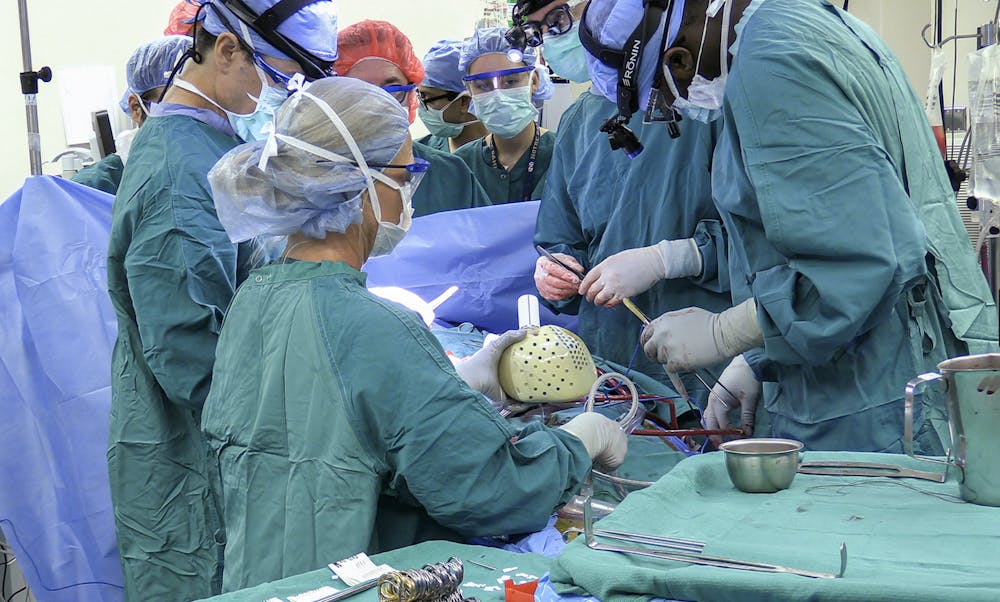Duke is now the first medical center in the United States to implant a new generation of an artificial heart in a patient.
On July 12, a surgical team at Duke University Hospital implanted the artificial heart in a 39-year-old man with heart failure. The procedure demonstrated that the device can act as a successful bridge transplant before patients receive a full heart transplant.
Matthew Moore from Shallotte, North Carolina, expected only to undergo heart bypass surgery following his referral to Duke in June after a sudden, unexpected diagnosis of heart failure.
But Moore’s condition quickly deteriorated as he required support for blood flow into both chambers of the heart. Traditional options such as the transplant of a traditional left ventricular assist device became too risky, as only one chamber of the heart can be supported.
Patients like Moore generally have to join a waitlist for a heart transplant. Some die waiting in line.
CARMAT, a medical company that develops heart implant technologies, received approval from the Food and Drug Administration last year to study patients with end-stage biventricular heart failure. The artificial heart developed by CARMAT is an implantable prosthetic that includes biological valves derived from bovine tissue and operates on an external power supply. The device has been studied in Europe, where it is approved for use.
If the CARMAT device receives full FDA approval, it would provide a life-saving bridge to a full heart transplant for patients whose hearts require assistance to pump blood through both chambers.
Duke Hospital was one of three transplant centers in the U.S. selected to join the study. The surgical team received specialized training to prepare for the implant procedure.
Led by Assistant Professor of Surgery Jacob Schroder and Professor of Surgery Carmelo Milano, the eight hour surgery involved removing both left and right ventricles of the heart and replacing them with an artificial heart. The procedure was challenging because Moore already had surgery within the last month.
The procedure went very well. Moore was stable throughout the surgery and continues to be in a stable condition.
“It really is a testament to the device,” Shroder said in a press conference. “The device sort of auto-regulates, which is amazing. We don’t spend a lot of time adjusting things. It adjusts itself.”
Currently, the most common patient this device will be used for are larger patients with severe failure of both sides of the heart who can accommodate the size of the device, Milano said in the press conference.
“There were a number of measurements that took place to make certain that the device would fit inside Mr. Moore,” Milano said.
Though Milano acknowledged that the FDA approval process is “complicated,” he sees “no reason why, if the technology is successful and safe, why it could not be downsized to accommodate some smaller patients.”
Theoretically, a patient with the CARMAT artificial heart could live for years, Schroder said.
“Our goal is, of course, to transplant [Moore] as soon as he's ready,” he said. He believes the team will be ready to give Moore a full heart transplant in three to four months.
Since Duke is one of the most active heart transplant centers in the entire world, it is prepared to enroll additional patients in the trial after Moore. Milano hopes the CARMAT trial will become one of the potential therapies that will help many patients with terminal heart failure.
“In the United States, there's probably 100,000 patients with terminal heart failure and there's only about 3000 or 4000 heart transplants per year. We're only getting three or 4,000 patients out of the 100,000 patients who have this terrible terminal condition. So there is a huge opportunity for additional therapies for this group of patients,” he said.
Moore’s wife, Rachel, who spent 10 years as a postdoctoral cardiothoracic nurse in Charlotte, said the decision for Moore to undergo the transplant was “very easy.”
“As a nurse, I understand how important it is to bring these advancements forward,” she said. “Both Matthew and I are so grateful that we’ve been provided an opportunity to participate in something that has the potential to have an impact on so many lives. We are just taking it day-by-day and hope everything continues to progress well.”
Get The Chronicle straight to your inbox
Sign up for our weekly newsletter. Cancel at any time.

Katie Tan is a Trinity senior and digital strategy director of The Chronicle's 119th volume. She was previously managing editor for Volume 118.

